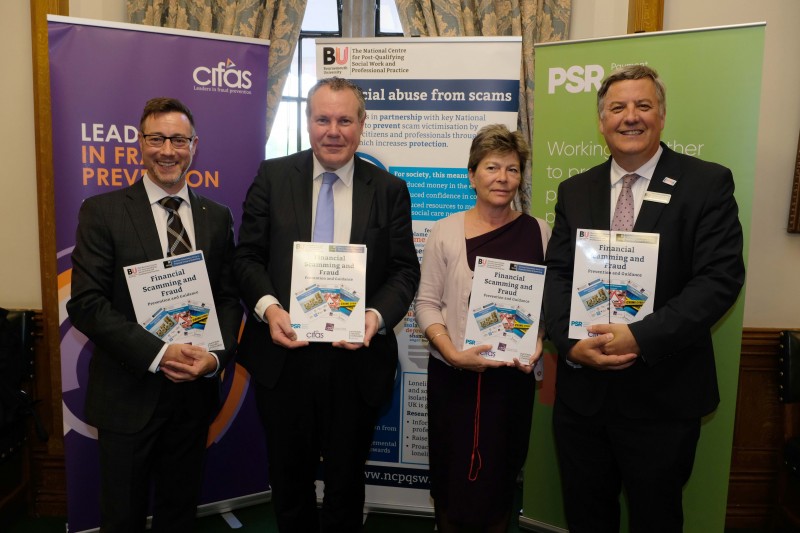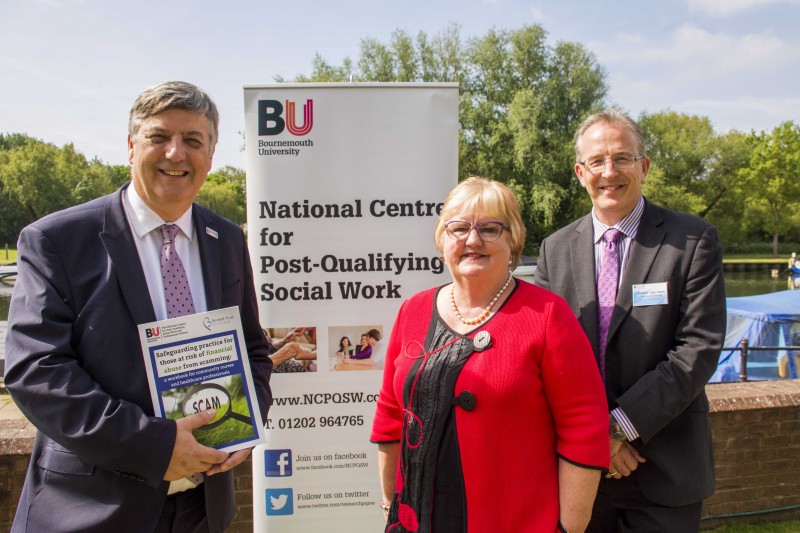Financial abuse through scams is a 21st century crime that is growing fast. Figures from The Office of National Statistics (ONS) England and Wales show that police recorded over 662,000 fraud offences from October 2016 to September 2017, and that an estimated 3.2 million incidents of fraud took place in the same period. It is a problem which particularly affects the older generation – the average age of a victim is 75.
The National Centre for Post-Qualifying Social Work and Professional Practice (NCPQSWPP) at BU is working in partnership with government and trade bodies to raise awareness of the scale of the problem and to gain a greater understanding of the reasons why people are drawn into a scam. To date, their work has bridged the research gap into the scale of the problem, highlighted the impact of scams on the lives of victims and the wider UK economy, and is informing best practice nationally.
In 2017, the National Centre was awarded the Chartered Trading Standard Institute’s (CTSI’s) first institutional Hero Award for its significant contribution to understanding the relationship between adult social care and Trading Standards enforcement.
To raise further awareness of the risks linked to financial scamming, the National Centre worked with Conor Burns MP and CIFAS, the fraud prevention organisation, to create a new All Party Parliamentary Group on Financial Crime and Scamming. In 2018, the National Centre produced the All Party Parliamentary Group report (Financial Scamming and Fraud), which was launched in parliament and sent to every MP.
Financial scamming guide
As part of the NSPQSWPP’s campaign to raise awareness of the prevalence of scamming and its pernicious impact, the Financial Scamming and Fraud Guide offers advice and guidance on what to watch for and how to avoid falling foul of scamming techniques and schemes.
The guide describes the types of scams currently taking place in the UK (ranging from internet scams to doorstep crime and mail scamming), as well as the scale of the problem, and outlines the campaign plan to protect vulnerable people from falling victims to scams. It also describes the sophisticated methods used by criminals to target people, sometimes over a long period of time.
The guide was created in partnership with the CTSI, National Trading Standards Scams Team, North Yorkshire Trading Standards, and City of London Trading Standards. This collaborative approach is vital when it comes to raising awareness. As well as the creation of the guide, it has also led to a copy of the Centre’s textbook Safeguarding Adults: Scamming and Mental Capacity being issued to every Trading Standards team in the UK by the CTSI.
Louise Baxter MBE
National Trading Standards Scams Team Manager at National Trading Standards
I cannot commend Bournemouth University's research and impact highly enough, they have truly been national leaders and they are widely known as the leading university in the UK in this area.
Further collaborations
Building on the guide, the NCPQSWPP has also been working with Age UK to develop a learning package, called the Scams Prevention and Victim Support toolkit. The pack aims to increase awareness of the risks posed by involvement in financial scams to older adults. Alongside the learning materials themselves, learning tools and games have been developed to engage the public in discussions about the risks involved.
More recently, the NCPQSWPP teamed up with the Burdett Trust for Nursing to publish a set of learning materials for community nurses and healthcare professionals targeting the work of scammers and the safeguarding of victims of financial abuse. These materials have been launched by the NHS England Safeguarding Team and the Queen’s Nursing Institute Scotland, being made freely available to all staff. The workbook, in particular, is supported by digital stories and a quick reference guide. It features a number of exercises for professionals looking at areas like the impact of scamming on health and wellbeing, mental capacity, scam typology and some of the psychological tactics employed by scammers.
The National Centre also works with a range of other partners, including in the financial services sector, to reduce the frequency and impact of financial scamming. Among these is Lloyds Banking Group, where learning resources have been developed to support frontline staff to better understand the needs of vulnerable customers and The Society of Later Life Advisers (SOLLA) who have sought advice from the NCPQSWPP.
In 2014, the Royal Mail and the National Centre launched a joint initiative to prevent mail scam in the UK. Royal Mail commissioned the National Centre to carry out research to support their understanding of how mail scams target specific groups by exploring demographic variables and high-scam mail postcodes. Royal Mail included the National Centre’s research as a key element of their campaign to stop fraudulent mail reaching UK households.
In June 2019, our All-Party Parliamentary Group (APPG) report ‘Cyber Fraud and Scamming’ was launched, which provides guidance about the major scams that the general population are facing online. NCPQSW were assisted in the production of this new publication by the National Trading Standards eCrime Team, The National Trading Standards Scams Team, The City of London Scams Team, Cifas, Chartered Trading Standards Institute (CTSI), Jungo and SOLLA.
The NCPQSW has also worked with Dr Elisabeth Carter, who has spent time researching and understanding the ‘persuasive impact and use of language‘ by fraudsters to convince their victims to part with their money. Together, they produced new guidance to help citizens and community health and social care workers to understand the power of the fraudsters. The key message is that we are all vital in spotting these issues and identifying them in the community.
The National Trading Standards Scams Team commissioned NCPQSW to assess the impact of the use of their TrueCall Call-Blocker on user well-being. Recommendations from the report, Exploring the Impact of Call Blockers on User Well-Being, include:
- Greater recognition of the impact that scam and nuisance calls have on well-being, regardless of whether there is actual engagement or any financial loss.
- All regular landline users are likely to benefit from call blocker technology.
- Call blockers should made available to vulnerable individuals to support them to live independently.
- Older people, those who self-identify as vulnerable, and individuals who live alone are most likely to benefit from the installation of a call blocker.
- Building on the previous work of The NTS Scams Team, further signposting would help provide clear guidance regarding the application for and the potential benefits of installing a call blocker.
Emily Rosenorn-Lanng and Stevie Corbin-Clarke were honoured to be invited to speak at the National Trading Standards Call Blocker, Wellbeing and Telco Launch Event on the 4th February 2021 to present this research to almost 200 trading standards officers from across the country, which has led to new connections and potential areas of research.
Catherine Randall
Deputy Head of Safeguarding, Nursing Directorate - Nursing and Midwifery Team, NHS England
The work of the National Centre particularly in the area of financial scamming has been of real value and significance within the NHS. Their innovative and ground-breaking work has been widely presented and informed practice within the NHS.
Identifying loneliness as a key factor
The National Centre is also working in a number of research areas, including a two-year research project commissioned by the Burdett Trust for Nursing to investigate the impact of scam involvement.
Loneliness exposes people to a diverse range of significant risks to mental and physical wellbeing. It affects people of all ages but is often triggered by particular life events such as bereavement, poor health, or cognitive impairment. Survey evidence shows that nearly three-quarters of elderly people in the UK report feelings of loneliness.
Building on previous research, the BU team found that successful interventions aimed at alleviating loneliness are those that focus on wellbeing and promoting ways of developing a person’s resilience and social networks. Facilitating social engagement in community activities to promote older people’s self-esteem can help. This can then reduce the likelihood that they will respond to scams. Equally important is raising awareness, empowering people to safeguard themselves against scams.
The work of the NCPQSWPP, in collaboration with its partners, has resulted in a significant increase in national awareness of the scale of financial scamming. Through these efforts, we are now seeing a national reduction in mail and telephone fraud, preventing thousands of citizens from being defrauded by scams and saving hundreds of thousands of pounds from being lost through fraud in the process. The National Centre’s multitude of projects to raise awareness of financial scamming have either had, or look set to have, a positive impact on society – equipping individuals with practical advice on limiting the impact of scamming or, better still, how to not fall victim to this crime.


